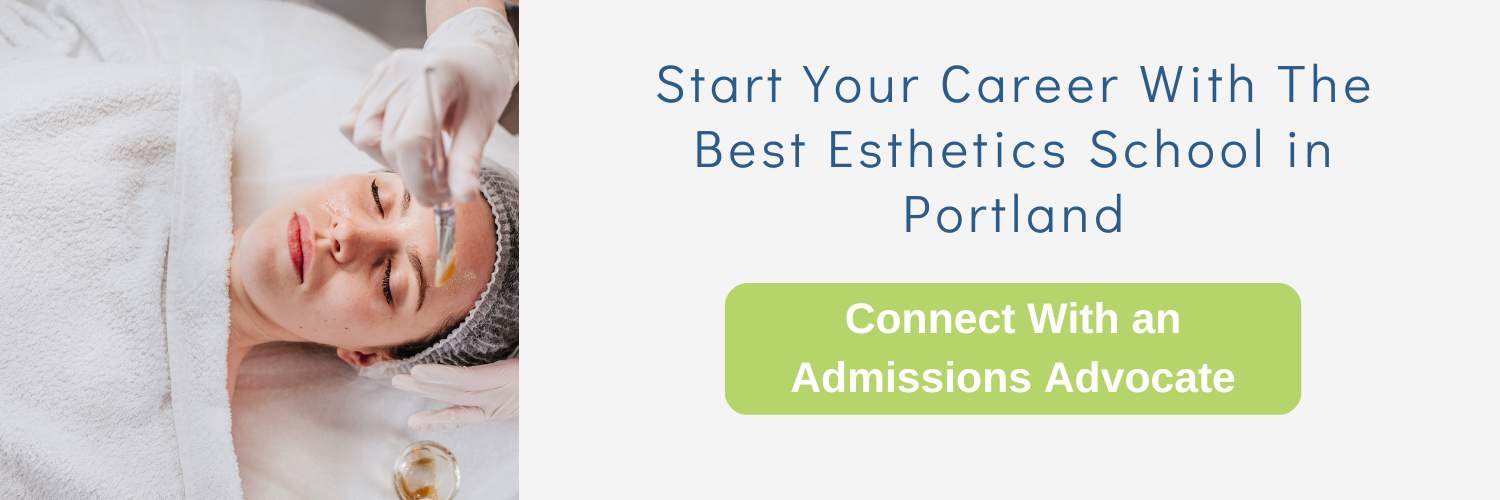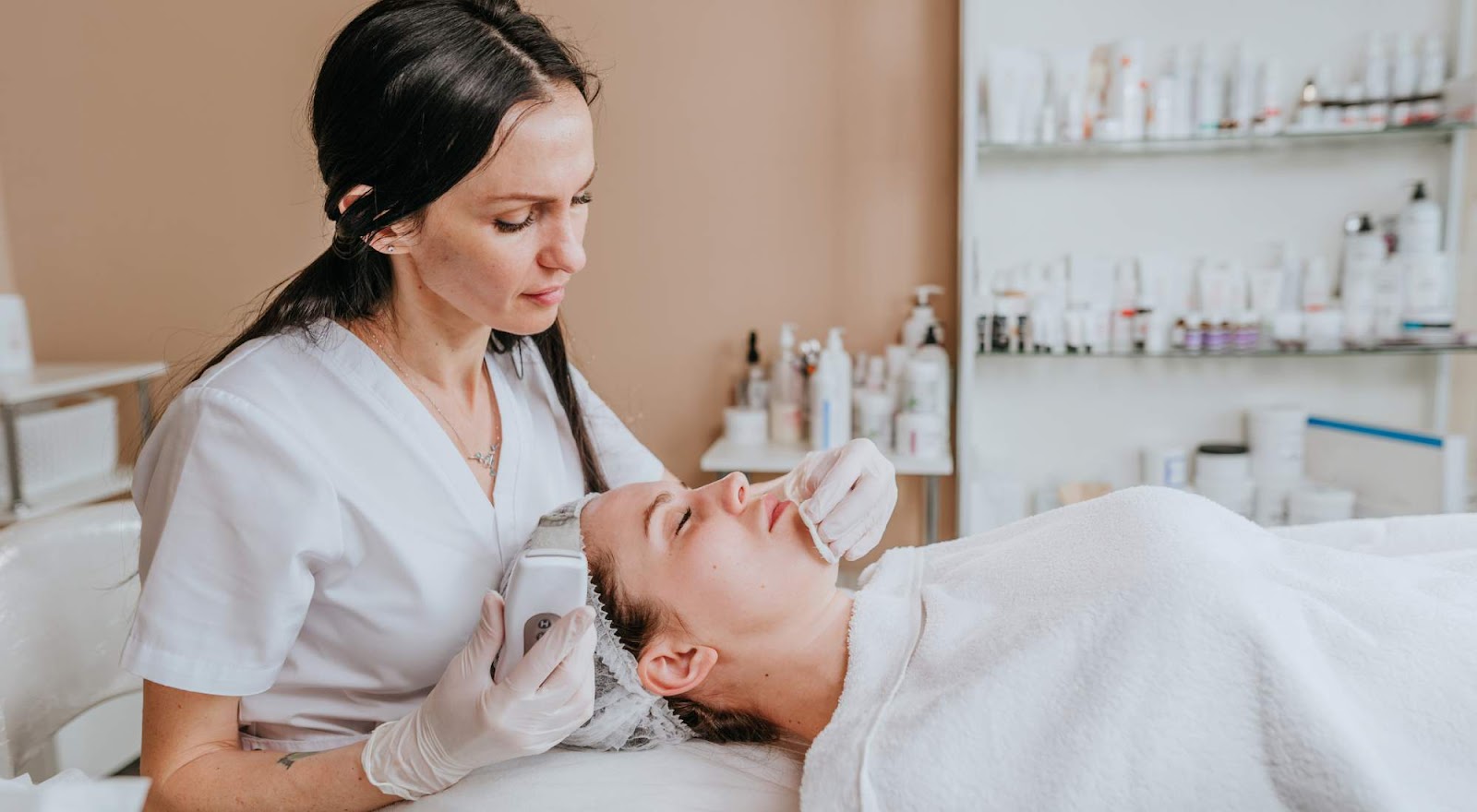What Do Estheticians Do? A Spotlight on the Day-To-Day Duties of an Esthetician
Have you always been interested in making your skin look its best and want to help others do the same? Or perhaps you love gadgets that use lasers or radio frequency and need to learn how to use them properly?
Then you may want to consider a career as an esthetician.
But what exactly do estheticians do? Where do they work? And what’s the best path to becoming an esthetician?
Keep reading as we answer all these questions and more.

What Does an Esthetician Do?
An esthetician is a professional who specializes in cosmetic treatments of the skin. These treatments may include — but are not limited to — laser hair removal, facials, waxing, makeup application, and more.
Estheticians have a passion for helping their clients, but perhaps even more importantly, they build fundamental relationships with the people they see regularly for years. Skincare can be personal and intimate as it affects one’s self-esteem and confidence in the world.
As an esthetician, you’re there to guide clients through many phases of life and you know lots of their intimate details. You may be helping them get ready for big events like a wedding, milestone birthday, or anniversary. It’s an honor to be able to share in that and help them feel their best and look great due to your work

What Are the Duties of an Esthetician?
The duties of an esthetician can vary greatly depending on what area of skincare interests you the most or what you want to specialize in. Most people find a niche within esthetics and that becomes their main focus. But first, you must enroll in a school and learn how to do everything.
At Spectrum Advanced Aesthetics, our basic esthetician’s course includes training in the following:
- European, clarifying, and sensitive skin facials
- Skincare consultation and analysis
- Brow and body waxing
- OxyGeneo oxygen facials
- Hydrafacials
- High-frequency and microcurrent skincare
- Ultrasonic skin spatula
- Chemical and enzyme exfoliation
- Dermaplaning
- Lash extensions
- Lash lifting and tinting
- Diamond tip microdermabrasion
- Professional makeup application
- Body wraps
- Sugaring
Let’s take a more in-depth look at some of the most common responsibilities of an esthetician.
Facials
While the world of facials has become quite specialized in recent years, all estheticians are trained to give basic facials consisting of:
- In-depth consultation and skin analysis
- Deep cleansing
- Facial massage
- A customized mask; and
- Personalized skin care products
Estheticians should tailor facials to suit their client’s skincare needs and personal preferences. Basic facials may also include microdermabrasion or dermaplaning.
Deluxe facials can include techniques using nano chips, skin oxygenation, or chemical peels.
Acne Treatment
Some people choose to have their acne treated by a dermatologist with a medication such as Accutane. But its long list of side effects — and the dangers of using it if you have other conditions — has many seeking alternative treatments.
Those with mild to moderate acne can see estheticians for exfoliation, extractions, and over-the-counter products to treat their condition. They can also get recommendations for skin care products to help with some of the side effects of acne and its treatment, such as dry skin.
Wraps, Scrubs, and Peels
Estheticians can treat the skin on the entire body by applying:
- Salt or sugar scrubs
- Clay masks
- Seaweed wraps
- And more
Chemical peels using alpha hydroxy acids such as glycolic, salicylic, or lactic acid are also popular treatments because they give great results without any downtime. They can be used on the face or other parts of the body to quickly exfoliate the skin and give it a healthy glow.
Microdermabrasion
Microdermabrasion is an excellent way to exfoliate and resurface the skin by passing over it with a diamond-tipped wand to gently remove skin cells.
Microdermabrasion is a popular treatment because it has benefits including:
- Smaller pores
- Fewer fine lines
- Softer skin
- Improvement of mild hyperpigmentation

Laser Treatments
Laser services offer a variety of different treatment types and benefits.
Estheticians offer specific laser treatments designed to:
- Improve skin’s tone and texture
- Target stubborn discoloration and acne
- Treat red areas and breakouts
- Remove tattoos
- Target fat cells; and
- Remove hair
Waxing
There are many different methods of hair removal, but waxing is one of the most popular offered by estheticians.
They can remove hair from pretty much anywhere, with some common areas being:
- Brows
- Chin
- Lip
- Arms
- Legs
- Underarms
- Happy trail; and
- Bikini area
Lash Extensions, Lifts, and Tints
Estheticians can help people who want to enhance the look of their eyelashes with several different treatments.
Lash extensions are individual synthetic fibers applied one at a time to each lash. They give your natural lashes a longer, more lush look.
Lash lifts can be compared to a perm for your eyelashes. They alter the shape of your lashes and help them grow in an upward direction.
Lash tints dye your natural lashes darker to help them appear longer and fuller. These are often combined with lash lifts.
Makeup Application
Clients often see an esthetician to have their makeup done for a special event like a prom, wedding, or other milestones. Estheticians have their own makeup kits and use clean application tools for each new person’s protection.
Seeing an esthetician to have your makeup done is great for people who aren’t confident with their application skills or want to get really glammed up with false eyelashes, a dramatic smoky eye, and more.

What Estheticians Don’t Do
While estheticians often work on the medical side of things, they are not able to do the same things as other skin care professionals such as a dermatologists.
For instance, estheticians don’t:
- Diagnose skin conditions
- Prescribe medications
- Use injectables or dermal fillers
- Suggest medical treatments for skin conditions
- Perform surgical procedures
While an esthetician is trained to help improve the appearance of a client’s skin, they aren’t dealing with the health of the skin by diagnosing and treating medical conditions.

Where Does an Esthetician Work?
Estheticians can work in a wide variety of environments, including:
- Salons
- Day spas
- Medi-spas (combination medical clinic and day spa)
- Dermatologist’s offices (to complement medical treatments)
- Resorts
- Cruise ships
- And more
Estheticians may also work on a freelance basis and travel to clients as needed. This works well for makeup applications or other services that use portable equipment.
How To Become an Esthetician
The first step in becoming an esthetician is finding an outstanding esthetics school. Make sure the school has high-quality instructors and offers classes for things you care about. For instance, if you’re most interested in the makeup application part of esthetics, you wouldn’t want to attend a school that doesn’t focus on that with its curriculum.
After completing your education, you will take your state board exam, get licensed, and add on any certifications you may be interested in. Then it’s time to find a job in an established salon, spa, or other office. You may even want to start your own practice.
As a licensed esthetician, you have almost limitless opportunities to do the work you love while building relationships with clients.
Spectrum Advanced Aesthetics: Helping You Achieve Your Goal of Becoming an Esthetician
Spectrum Advanced Aesthetics is the first advanced aesthetic institute in Oregon. Whether you want to work in medical esthetics or other aspects of the skincare industry, we want to help you achieve that dream by offering exceptionally qualified staff along with state-of-the-art equipment and devices.
If you’re located in the Greater Portland area and would like to become an esthetician, connect with an admissions advocate now. You can enroll today and get your standard or advanced aesthetician license in no time.
Our goal is to elevate the esthetics industry and its future leaders. Take the first step to start the career of your dreams with Spectrum Advanced Aesthetics.

The content in this blog is not intended to be a substitute for professional medical advice, diagnosis, or treatment. Always seek the advice of your physician or other qualified health provider with any questions you may have regarding a medical condition.


.svg)
.svg)